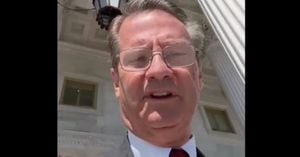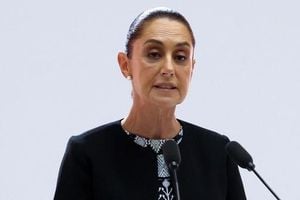On Wednesday, the entertainment world was rocked by the news of influencer Marianne Gonzaga's arrest after she allegedly stabbed Valentina Gilabert, the current partner of her ex-boyfriend, during a confrontation at Park Pedregal, Mexico City. This shocking event has drawn widespread attention, causing social media users to raise urgent questions about celebrity accountability.
The 24-year-old Gonzaga flew from Cancún back to Mexico City to reunite with her ex, who was reportedly accompanied by Gilabert at the time. According to journalist Carlos Jiménez, known as C4, the meeting turned violent when Gonzaga and Gilabert became embroiled in a dispute over the ex-boyfriend.
Witness accounts suggest the argument escalated quickly, resulting in Gonzaga stabbing Gilabert multiple times, including injuries to the neck, chest, and arms. Reports indicate Gilabert suffered more than 15 stab wounds, leading to concerns for her life. Following the incident, officers from the Secretaría de Seguridad Ciudadana de la Ciudad de México (SSC-CdMx) responded to the emergency call. Gilabert was eventually taken to the hospital for treatment.
“Marianne Gonzaga Rodríguez arrived from Cancún to see her ex-boyfriend at Park Pedregal. There was Valentina Gilabert, the new partner of her ex. They fought, and she stabbed her with a knife in the neck,” Jiménez reported on his social media account.
The aftermath of the attack has sparked intense discussions on social media platforms about the treatment of influencers within the legal system. Many users have voiced their discontent over what they perceive as disproportionate leniency offered to celebrities. Comments like, “Marianne Gonzaga must be processed and judged for stabbing Valentina Gilabert, just like Fofo Márquez was,” highlight the demand for fairness irrespective of fame.
Prior to the stabbing, Gonzaga had posted content on TikTok, showcasing her daily life and the friendship dynamics with her co-stars. It painted the picture of what some might call glamorous existence. Yet, within hours of the arrest, this carefully curated image crumbled as users flooded her posts with comments of disbelief and judgment.
The charged circumstances surrounding the incident also added fuel to the discussions about gender and violence, especially considering the nature of the attack. Online commentators have posed uncomfortable questions about whether the legal system would hold Gonzaga to the same standards as her male counterparts, especially referencing cases involving other influencers.
Prior to the attack, Gonzaga was known for her vibrant presence on social media, with over 300,000 followers on Instagram and more than 140,000 followers on TikTok. Her content primarily revolved around beauty routines, lifestyle tips, and her experiences as a new mother. Known for her relatable vibes and engagement with fans, her abrupt plunge from influencer to criminal suspect has sent shockwaves.
Details continue to emerge concerning Gillabert's condition and the nature of her injuries. Witness reports suggest the violence of the attack was unexpected, prompting the authorities to ramp up their investigation. Local police indicated they would pursue the case vigorously, examining the possibility of charges related to attempted murder, alongside the outcry from the public.
Marianne's travel from Cancún to Mexico City also raised eyebrows. Why did she feel it necessary to confront her ex-boyfriend, and was it planned? Speculations loom over whether previous conflicts had been brewing before this explosive incident erupted. While details surrounding the timings and motivations behind her actions remain murky, social media continues to dissect every aspect of the story.
Social media users were particularly quick to point out the double standards they perceive within the justice system. Feminists within the discourse highlighted how the narrative surrounding women committing violence often carries stigma, questioning whether Gonzaga would face the same judgment as her male counterparts. This has stirred conversations on broader cultural perceptions of gender-based violence.
Gonzaga’s case exemplifies how influencers can suddenly fall from grace. Once seen as relatable figures, their actions now seem subject to public scrutiny, and their supporters may turn on them swiftly. This incident emphasizes the increasingly challenging reality facing those who maintain their lives publicly. Influencers are constantly reminded of the fine line they walk between personal decisions and public impact.
Images and footage from the crime scene circulated online, igniting outrage among followers and observers alike. Many have called for harsh penalties should Gonzaga be convicted of her crimes, highlighting the belief her fame shouldn't excuse or mitigate her alleged actions.
While the outcome of this case remains unclear, what is evident is the complex interplay of fame, accountability, and societal expectations on influencers. The demands for justice resonate strongly, as the community grapples with the scary reality of violence among its figureheads. Followers are left questioning how someone they once admired could become embroiled in such tragedy.
Moving forward, the legal system faces the challenge of handling this high-profile case sensitively as more details emerge. How will the pressing issues of gender equality, public scrutiny, and violence be addressed by those who hold the power to enforce justice? The public awaits answers, underscoring the gravity of this shocking event.



